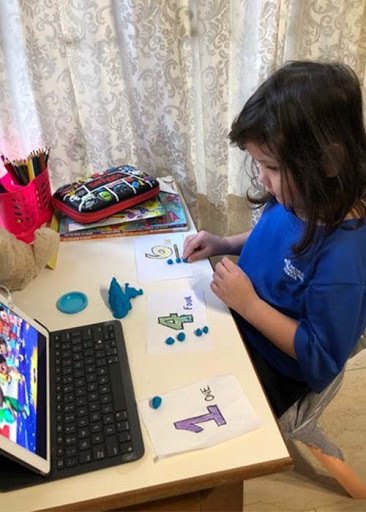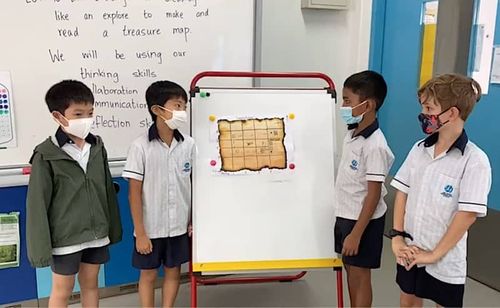During the circuit-breaker period in Singapore when schools closed, OWIS offered students a full e-learning programme with a balance of academics, specialist lessons, recreational activities and social check-ins. As per Phase 1 rules of school re-opening in June, students rotate each week between in-class learning and virtual learning at home. Here’s a look at our e-learning programme for our Early Childhood students.
OWIS’ E-learning programme for our Early Childhood students:
Our e-learning programme for Early Childhood students has been designed to, as far as possible, mirror the learning that takes place when we are on campus. This isn’t easy with young children!
At school, each class teacher has three or four 30-minute carpet sessions with their whole class when they explain concepts and the children are given opportunities to question and understand what they are learning about through whole-group activities. During this time, they have the opportunity to communicate with their peers and to bounce ideas off one another.
During e-learning, these 30-minute sessions happen through live video calls, but they are spread throughout the day to ensure the children can focus and to make the impact of e-learning easier for families. This also ensures that children are not glued to their screens, or that they do not become disengaged in using technology. For many, the initial excitement of being at home and being able to use technology, which for some may usually be limited in the home, will wear off quickly. They may start missing their friends, find it hard to concentrate or miss the variation in classroom learning. For this reason, it is important that the sessions remain short, are spaced throughout the day and are followed by a range of activities.
Two to three of the live video sessions per day are lessons, which lead into independent tasks that the children complete via the Seesaw (communication) app. With the Seesaw app, students are able to show their learning through their digital portfolio. Families are able to monitor the work to gain insight into what the children are doing, and the teachers are able to continuously analyse their students’ progress. This helps them remain active in their teaching and make adjustments when needed. Using Seesaw children might document the growth of a plant with a written and photo diary, compose and perform a song about a kangaroo, or interview their parents about their jobs. All of this is uploaded onto the app. We have purposefully not included tasks that require printing.
As OWIS uses the inquiry-based PYP framework for our EC students, the activities assigned to students on Seesaw and during the video sessions are designed to continue their inquiry and are as engaging, active and dynamic as possible. Children in the live video sessions sing, dance and play together, as well as inquire into the world around them and develop specific skills.
Although we know that open-ended tasks and inquiry-based learning are most beneficial to students, we recognise that parents need to focus on their own work during this online learning period and open-ended tasks can require parental support for younger children, so therefore a balance of focussed, individually manageable activities is provided.
This might include, for example, a task where the child designs a new animal and voice records him/herself explaining it or the completion of some mathematical or grammatical problems that the child can manage without parental support. By keeping these tasks simple yet effective, the pressure is taken off the parents while at the same time maintaining their child’s learning.

In addition to video lessons, one live video session per day is either a story-time and wrap-up session, to finish the day on a calm and positive note, so that the children are settled for the evening. There are also social check-in sessions, which give children the opportunity to chat with their classmates in as natural an environment as possible, to retain and strengthen their communicative bonds. Social time might include fun activities such as games of Pictionary, quizzes, show and tell or calming activities, such as yoga or mindfulness.
Specialist lessons and weekly E-learning menu:
Specialist subject teachers (Art, Mandarin, Music and PE) provide instructive videos for the children, which allows families to be flexible with their time. It also means that families can get involved in these classes. They may choose to start their day with some PE to get everyone feeling fit, active and energised for the day ahead. Or they then may choose to spend the time after lunch relaxing and doing some art as a family. Art and Mandarin teachers also provide follow-up activities for the children to complete on Seesaw.
In order to build more flexibility and student agency into the programme, a weekly e-learning menu, including a range of skills-based creative and constructive tasks is sent to the families, and time is devoted throughout the week to either complete off-screen tasks for this menu or to free play. This helps parents plan their time and also set goals for the students. If parents know that they are going to have a busy day filled with their own work meetings, they may choose to focus their children’s attention on the activities that will keep them most occupied and allow them to work independently.

Our Teaching Assistants offer 1:1 sessions with students in order to help them with their reading, to consolidate concepts covered in class, to provide communicative skills development or simply to play with the children. These sessions are important as the Teaching Assistants will be able to monitor children’s emotions and feelings about their home learning. They can talk to children about any worries and help them come up with constructive ideas to tackle any problems. They also ensure that the children feel confident that this is just for the short term and that they will be back to school with their friends and teachers before long.
A weekly EC assembly is also provided, showcasing children’s work from the week and reinforcing the theme of the week. This brings all the children together and helps them understand that although they are not all in the same place, they are all working towards the same goals.
In order to ensure that families are as prepared as possible for the week ahead, each class publishes an e-learning schedule, which outlines any materials that might be needed for the lessons in advance. We provide a list of materials that each family might find useful to have in stock, and teachers are asked to ensure that lessons use these resources only where possible. If families are not able to get the resources, we offer alternative options.
External websites that children have to access for their learning activities are limited to those that are vital (for example, access to levelled reading books) and students are never asked to use any external site that requires a login so that families don’t need to keep track of lots of passwords and for security reasons.
Security is a huge concern when designing an e-learning programme, and has been at the top of our list of considerations. Strict security protocols and settings with unique codes and passwords that are changed weekly are emailed separately to parents, and not shared outside of the school community. We offer online safety advice and support whenever needed and always monitor our systems. This ensures that our families can feel reassured that their children are safe while e-learning.

Words of encouragement from our parents!
Here’s what one of our EC parent, Tanya C., had to say about her child’s EC e-learning lessons:
“Ms Deepali has done an amazing job! My son has been engaged in all his lessons and it is testament to the time and effort she has given to the students. I appreciate her commitment, especially since she has her own daughter also e-learning at home!”
If you’d like to know more about our Early Childhood Programme or how OWIS fosters a lifelong love of learning from a young age, do get in touch with us.
(This blog was originally written in collaboration with Ms Luna Deller, former Deputy Head of School, OWIS Nanyang.)














